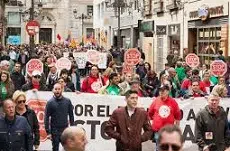Latin is where we can establish that the etymological origin of manifestation is found. Specifically, it derives from the word “manifestatio”, which is formed from the sum of several lexical components of said language:
-The noun “manus”, which is synonymous with “hand”.
-The adjective “festus”, which can be translated as “hostile”.
-The suffix “-cion”, which is used to indicate “action and effect”.
The term refers to the act and the consequence of manifesting or manifesting : expressing, exposing, declaring.
Among the words that can function as synonyms for demonstration, we can highlight some such as exhibition, declaration, meeting, concentration, protest, sit-in, march or parade, for example.
 A public meeting that often takes place on the move (that is, with a movement from one place to another) is called a demonstration. Those who participate in these meetings do so with the aim of protesting or demanding something.
A public meeting that often takes place on the move (that is, with a movement from one place to another) is called a demonstration. Those who participate in these meetings do so with the aim of protesting or demanding something.
Demonstrations, therefore, take place in sites of symbolic importance , such as the main square of a city or in front of Congress . The people who attend the call intend to express their disagreement and exert pressure on the authorities who can modify reality and provide a solution to the issue.
Suppose a child is murdered by criminals. The case provokes indignation in the population and several non-governmental organizations decide to call a demonstration to demand greater security from the rulers. Thus, thousands of women and men gather in front of the Government House in a demonstration that raises this demand.
On many occasions, demonstrations lead to acts of violence . This can be linked to the behavior of human beings in crowds, to infiltrators who seek to generate chaos or to the repression of the security forces that prevent the development of the demonstration, for example.
Throughout history there have been demonstrations that are considered to have changed the course of history. Among them are these:
-The Demonstration or March on Washington. This took place on August 28, 1963 in the city that gives it its name. It was led by Martin Luther King and the objective was to end violence in the country and demand the same civil rights for whites as for people of color, including the right to vote.
-The Storming of the Bastille. On July 14, 1789, this demonstration and march of certain violence took place in Paris, carried out by the armed people. took the
Bastille, which was the symbol of absolute monarchy, and that action led to the French Revolution.
-The demonstrations carried out by suffragettes in 1917 in Washington to demand women's right to vote. And they achieved their goal some time later.
It is important to keep in mind that the right to demonstrate is one of the pillars of democratic regimes. All citizens should be able to express their opinions without being persecuted for it. The demonstrations, in any case, should not violate other rights (such as the freedom to circulate on public roads).
